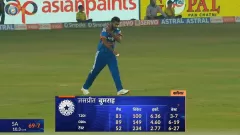Sri Lanka's new ODI skipper Kusal Perera has revealed that the national selectors expect him to take up more responsibility in the format after being handed over the captaincy. Perera on Wednesday (May 12) was named captain for the Bangladesh ODIs but the 30-year-old averages a modest 31 in the format, something he hopes to improve.
What the selectors told me when they appointed me was that I often get a 50 or a 60 and get out without getting to a 100, Perera said. I accept that. If I score a hundred, the chances of winning the match go up. You can't get a 100 every game, but when you get a start, you need to make sure you convert. They expect me to take that responsibility.
Despite not possessing a healthy average, Perera has a strike rate of 92 in ODI cricket and has backed himself to play in the same vein. In order to improve his side's fortunes in 50-over cricket, he has now urged his teammates also to adopt a fearless approach.
We have to play fearless cricket to win matches, he pointed out. You can't be fearful about losing. If you're worried about your place, you aren't going to give 100%.

What I'm going to tell the players is to go and give it everything. If we play fearlessly even when we are practicing, then you will be able to play the same way in a match. That's what I've told the team.
If we are fearful, we will fall even further. I'm trying to build a culture where the players have a lot of confidence.
Even though that brand of cricket does have it's own perils, the left-hander believes the chances of succeeding are greater as well.
I really like to play fearless cricket personally, and that's where my success has been, he noted. Whenever I've played with fear, it hasn't worked for me.
I want everyone else to play like that. You can't guarantee that you will go right playing this way, but the chances of things going well are greater.
But you have to practice well to instill that fearlessness. Because if you are 100% certain about the shot you're playing, you can play without fear.
You need to understand your strengths and weaknesses. Where does the ball need to be for me to hit it? Will I get myself in trouble by hitting there? You need to have that understanding.
If you're a bowler, you need to know which ball can get you a wicket, and which will help you bowl a dot. These things help you play fearlessly. As a fielding unit, you have to carry that same ethos as well, and I have big hopes for the upcoming Bangladesh series about our fielding.
The three-match series will commence on March 23 at the Shere Bangla National Stadium in Dhaka.











